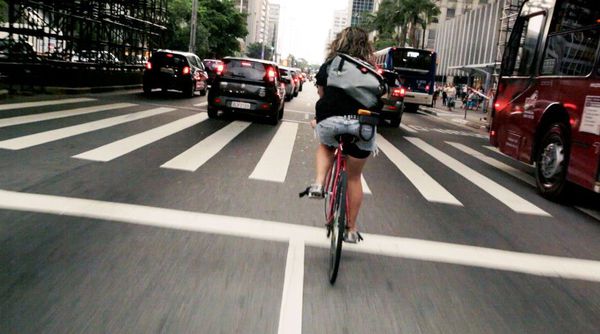Eye For Film >> Movies >> Bikes Vs Cars (2015) Film Review
Bikes Vs Cars
Reviewed by: Jennie Kermode

Last month Oslo took the momentous decision to ban cars completely from its city centre (with special arrangements to be made for disabled people). It's the first European city to do so, though Saudi Arabian architects recently produced innovative plans for a car-free city with the aim of creating somewhere that women could live, work and study despite being forbidden to get behind the wheel. Both these incidents are too recent to be covered in Bikes Vs Cars, but they're indicative of a growing belief that there must be better ways of doing things - that it would be healthier for most people to walk more, that good quality public transport can serve urban transport needs. Then, of course, there's the bike.
A 2009 study carried out in Portland found that, among residents who didn't cycle, 77% said the road conditions were too poor and 75% felt it was unsafe. In other words, a lot of people chose not to cycle because of the impact of cars. Early on in this documentary, we see an image painted on a Rio de Janeiro street: a cyclist with arms outstretched. Adjacent to it is a name: Julie. She was young and lively, he friends say, recounting the way the accident happened, the way the second bus ran over her when she was already on the ground. But they stick with their bikes. Part of it is about affordability - public transport fares are steep ad running cars is beyond most of them - but it's also about standing up, through their very presence, for their right to use the road, for their right to be recognised as co-owners of this infrastructure which their taxes have contributed to.

This isn't a local issue. People around the world say much the same; there are many voices in Fredrik Gertten's documentary. The US stands out as a notable automobile addict, with drivers spending an average of three hours a day in their cars and spending a quarter of their income on fuel. A series of still photos show us glimpses of cities where the film camera doesn't stray: there's the notorious chaos of Lagos, the slowly rising smog of London, the perpetually clogged arterial roads into Shanghai. Criticising this does not require much effort, especially in light of the fact that the car driving population of the world is expected to double within the next 35 years. Is it, then, enough to criticise?
Despite a title that might suggest more balance, there's only really one proponent for cars here, and his main point seems to be that some cyclists are really irresponsible on the road. Whilst this is doubtless true, it's not clear that putting them in charge of larger, faster, heavier vehicles would be much of a solution. It's fair enough for the film to have some bias, as it sets out its stall early on, and arguments are made more generally about why people find cars appealing. It might benefit, however, from taking on and deconstructing more of the opposing arguments, rather than simply relying on forwarding those of the cyclist lobby.
In between the interviews material and the street scenes, we're supplied with a series of infographics looking at the economics and quantitative sociological dynamics of the situation. There are simplistic in places but accessible and not too intrusive. At the very end, as the credits roll, there's a joyous naked bike ride sequence which perhaps communicates better than anything else why people ride. It's cheap, it's healthy, it ought to be a right, and importantly, it's also fun.
Reviewed on: 15 Nov 2015















